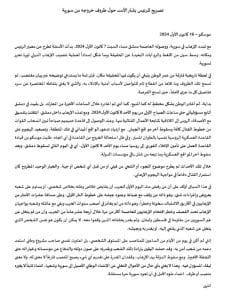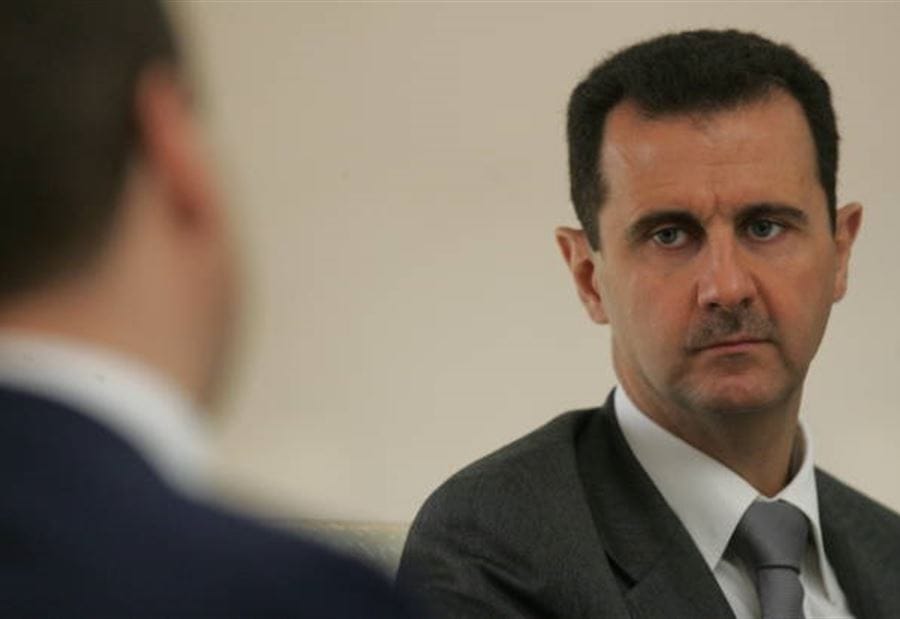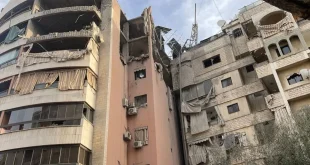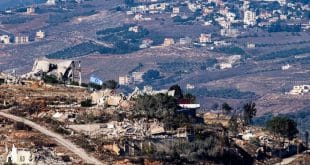“لم أغادر بشكل مخطط”: أول بيان لبشار الأسد بعد سقوط دمشق وهروبه إلى موسكو
أصدر الرئيس السوري بشار الأسد، أول بيان له منذ انهيار نظامه وهروبه إلى موسكو في 8 كانون الأول 2024، وذلك عبر الصفحة الرسمية لرئاسة الجمهورية السورية على منصات التواصل الاجتماعي، بعد رفض وسائل الإعلام العربية والعالمية نشر بيانه، بحسب قوله.
في هذا البيان الذي نُشر في وقت متأخر، وصف الأسد سيطرة المعارضة المسلحة على العاصمة دمشق بأنها نتيجة لما أسماه “الإرهاب المتمدد”، ونفى وجود أي خطة مسبقة لهروبه. وادعى أنه لم يغادر العاصمة إلا خلال الساعات الأخيرة من المعارك الحاسمة.
النص الكامل للبيان: رؤية الأسد للأحداث
بدأ الأسد بيانه بالقول:
“في لحظة تاريخية فارقة من عمر الوطن، ينبغي أن يكون للحقيقة مكان. ثمة ما يستدعي توضيحه عبر بيان مقتضب، لم تسمح تلك الظروف وما تلاها من انقطاع تام للتواصل لأسباب أمنية بالإدلاء به. هذا البيان لا يغني عن سرد تفاصيل ما جرى لاحقًا عندما تسنح الفرصة.”
وأكد أنه ظل في دمشق حتى صباح يوم الأحد 8 كانون الأول، حيث انتقل بتنسيق مع الحلفاء الروس إلى قاعدة حميميم في اللاذقية لمتابعة العمليات العسكرية. ومع وصوله إلى القاعدة، أدرك أن الجيش السوري قد انسحب من جميع خطوط القتال، وأن دمشق سقطت في أيدي المعارضة.
وأضاف أن موسكو بادرت إلى تأمين إخلائه الفوري إلى روسيا بعد انهيار الأوضاع العسكرية، قائلاً إن هذا الإجراء كان ضرورة أمنية فرضتها الظروف على الأرض.
“لم أطلب التنحي”: الأسد يدافع عن مواقفه
رفض الأسد في بيانه المزاعم التي تتحدث عن لجوئه أو تخليه عن مسؤولياته، مشددًا على أن الخيار الوحيد الذي طرح أمامه كان “مواصلة القتال ضد الإرهاب”. وادعى أنه رفض منذ بداية الحرب المساومة على مصير بلاده مقابل أي مكاسب شخصية.
وأشار الأسد إلى أنه ظل قريبًا من قواته العسكرية في الخطوط الأمامية، مدعيًا أنه حافظ على تماسك موقفه رغم المخاطر الكبيرة والتهديدات المباشرة التي تعرضت لها العاصمة دمشق خلال المعارك.
“وفاء للحلفاء”: الأسد يشيد بمواقفه الإقليمية
في جزء آخر من بيانه، أكد الأسد أنه لم يتخلَ عن حلفائه في فلسطين ولبنان، في إشارة إلى دعمه المستمر للحركات المسلحة الموالية لنظامه. وادعى أن الشخص الذي ظل وفيًا لحلفائه لا يمكن أن يتخلى عن شعبه، مستنكرًا الاتهامات التي طالته بالخيانة.
“مع سقوط الدولة، المنصب لا قيمة له”
تحدث الأسد عن انهيار الدولة السورية بعد فقدان السيطرة على العاصمة، مشيرًا إلى أن المنصب لم يعد ذا أهمية مع فقدان القدرة على تقديم أي شيء للوطن. وقال:
“مع سقوط الدولة بيد الإرهاب وفقدان القدرة على تقديم أي شيء يصبح المنصب فارغًا لا معنى له، ولا معنى البقاء في المسؤولية.”
ورغم ذلك، أكد الأسد أنه لن يتخلى عن انتمائه الوطني لسوريا وشعبها، قائلاً إن هذا الانتماء ثابت ولا يتغير بتغير المناصب أو الظروف السياسية.
التجاهل للأسباب والتداعيات
اللافت في البيان أن الأسد لم يقدم أي توضيحات حول الأسباب الحقيقية لانهيار الجيش السوري السريع أو حول الجرائم التي ارتكبت خلال فترة حكمه. على سبيل المثال، تجاهل الأسد الحديث عن مجزرة سجن صيدنايا، التي وصفتها منظمات حقوق الإنسان بأنها واحدة من أبشع الفظائع المرتكبة في السنوات الأخيرة.

“I Did Not Leave in a Planned Manner”: Bashar al-Assad's First Statement from Moscow
On December 8, 2024, Syrian President Bashar al-Assad issued his first public statement following the collapse of his regime and his evacuation to Moscow. The statement was shared via the official social media page of the Syrian Presidency, claiming that Arab and international media outlets had refused to publish his message, forcing him to resort to social media platforms.
In his late-night statement, Assad described the opposition factions that had taken control of Damascus as “spreading terrorism” and denied any premeditated plans to flee the capital. He asserted that he remained in Damascus during the final hours of the decisive battles.
The Full Text of Assad's Statement: His Perspective on Recent Events
The statement begins with Assad saying:
“In a historic and defining moment for the nation, it is necessary to allow the truth to have its place. Certain matters must be clarified through this brief statement, as the circumstances and the subsequent total breakdown in communication for security reasons prevented me from addressing them earlier. This statement is not a replacement for a detailed account of what transpired, which will come when the opportunity permits.”
Assad claimed that he stayed in Damascus until the morning of Sunday, December 8, before being transferred, in coordination with Russian allies, to Hmeimim Airbase in Latakia to oversee military operations. Upon his arrival at the base, he realized that Syrian forces had withdrawn from all frontlines and that Damascus had fallen into the hands of the opposition.
He added that Moscow intervened to secure his immediate evacuation to Russia following the complete collapse of military operations, calling it a necessary step dictated by the dire security situation on the ground.
“I Never Requested to Step Down”: Assad Defends His Position
In his statement, Assad dismissed claims that he sought asylum or discussed stepping down from his role, emphasizing that his sole focus had been on “continuing the fight against terrorism.” He claimed to have rejected, from the onset of the war, any compromises involving Syria's future in exchange for personal safety.
Assad also claimed he stood alongside his soldiers on the frontlines during the most critical moments, saying he refused to abandon Damascus despite direct threats to the city by opposition forces.
“Remaining Loyal to Allies”: Assad's Regional Stance
Assad highlighted his unwavering loyalty to his allies in Lebanon and Palestine, referring to his continued support for regional armed groups aligned with his regime. He argued that someone who remained loyal to his allies could not be accused of betraying his own people, rejecting accusations of disloyalty outright.
“With the Fall of the State, Titles Lose Their Meaning”
Assad addressed the broader consequences of the Syrian state's collapse, arguing that the presidency held no significance once the government lost its capacity to function. He explained:
“With the state's fall into the hands of terrorism and the loss of any ability to offer something meaningful, holding a position becomes hollow and meaningless. Staying in such a role has no purpose.”
Nevertheless, Assad affirmed his unwavering national identity and allegiance to Syria and its people, stating that his commitment would not waver with changes in political roles or circumstances.
Translated by economyscopes team
المصدر: رصد موقع سكوبات عالمية إقتصادية
 سكوبات عالمية إقتصادية – EconomyScopes إجعل موقعنا خيارك ومصدرك الأنسب للأخبار الإقتصادية المحلية والعربية والعالمية على أنواعها بالإضافة الى نشر مجموعة لا بأس بها من فرص العمل في لبنان والشرق الأوسط والعالم
سكوبات عالمية إقتصادية – EconomyScopes إجعل موقعنا خيارك ومصدرك الأنسب للأخبار الإقتصادية المحلية والعربية والعالمية على أنواعها بالإضافة الى نشر مجموعة لا بأس بها من فرص العمل في لبنان والشرق الأوسط والعالم




